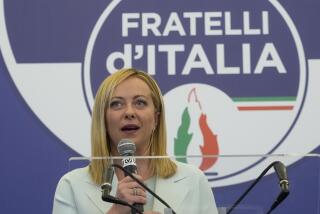Italy’s Craxi: Leading By Weight and Not Numbers
- Share via
ROME — Just as Frankenstein must be held ultimately responsible if his assistant reached for the wrong jar of human brains during that lab experiment, so must Italy’s always-in-charge party, the Christian Democrats, take the responsibility for creating the first Italian political cult figure since Benito Mussolini. His name is Bettino Craxi, and he is the man the Socialists reelected this month as their leader with 94% of the vote at the party’s convention. He is a one-man party.
The Catholic party’s role in Craxi’s resistible rise was in passively allowing him to become prime minister in 1983, when his party had obtained only 11% of the country’s vote, while the Christian Democrats held 33% (and the Communists 30%).
The Christian Democrats relinquished the premiership because their clandestinely financed four factions were themselves feuding. The party was in disarray and a strong coalition government meant another one requiring the support of the Socialists and others. The Christian Democrats opted for what seemed then like the lesser evil, the alternative being a deal with the Communists. The Communist leader, Enrico Berlinguer, who died in 1984, is remembered for having described Craxi as “a danger to democracy.” The powerful Catholic party thought it could dominate him. It failed.
The premier’s office, during the nearly four years that Craxi served there, was used (as his predecessors had used it) to get “his” men in as presidents of banks, as president of RAI, the state-owned radio-TV network, and as editors of those newspapers that had been critical or unenthusiastic towards Craxi. Controlling the money and the media can give a very small party a certain leverage--one that will not vanish when Craxi leaves office.
The last eight months of Craxi’s reign as premier can be summarized:
July, 1986. After too many setbacks in Parliament, Craxi resigned, knowing that there would not be anyone to take his place. He was in fact called back to office. He agreed to resign in March, to allow a Christian Democrat to replace him during the last year before national elections become obligatory by law. He had already garnered admiration outside his party for standing up to U.S. might--and Ronald Reagan’s personal plea--in refusing to hand over the Arab terrorists responsible for the hijacking of the Italian cruise ship, the Achille Lauro.
October, 1986. Craxi said in interviews that while he really longed to get back to running the party, he had never promised to resign after his party convention in March. The Christian Democrats began biting their collective nails.
February, 1987. Craxi announced that Italy had overtaken Britain and was now the fifth-ranking industrial power in the world. Foreign economists said that might have been true for a day or two, due to fluctuating exchange rates. Dividing the gross national product by the population was a dubious test of economic strength, anyway, and countries like Kuwait would always win.
Some Italians asked what was the point of being economically sound (if true), when Italy has one of the worst systems of public administration in Europe; overcrowded hospitals, often without medicine or even gauze; 11% unemployment (rising to 16% south of Rome), and a slowness of justice that is an international scandal? And not even the trains run on time.
March, 1987. Craxi appeared before Parliament to read a summary of his achievements and then went to President Francesco Cossiga to resign. He was not fulfilling his famous promise, he explained, but resigning because “the Christian Democrats have polluted the air.” His farewell speech sounded like an opening campaign rouser.
Both the Socialists and the Christian Democrats--in fact all parties except the neo-fascists--do not want premature national elections.
The Socialists, until six months ago, were pro-nuclear power, but suddenly switched to “no, grazie.” Their switch was no doubt prompted by municipal elections last year in which the Verde, or Green, Party (after West Germany’s Greens) began winning a fair share of voters--voters the Socialists would like to claim.
The other reason for the about-face on the nuclear issue was that a national referendum, now slated for June 14, was to deal with the nuclear question. By law a referendum and a national election cannot be held in the same year. Therefore the Socialists suddenly developed an overriding passion to defend “the people’s right to tell Parliament what they think”--a right the Catholic party was trying to “rob” them of, preferring the elections to the referendum. The anti-nuclear issue became a convenient excuse for the Socialists to postpone elections, especially after surveys had told them they could not expect much gain.
April, 1987 . On Good Friday, President Cossiga asked Amintore Fanfani, the 79-year-old chairman of the Senate, to put together his sixth government in the last 33 years. The peppery Tuscan, sometimes known as the Christian Democrats’ “last thoroughbred,” assembled his Cabinet in one day. Craxi, still officially the president’s first minister, told Cossiga that if Fanfani had been called in to preside over the dissolution of Parliament, the head of state was violating “the letter and the spirit of the constitution.”
Craxi then flew off for a vacation in Tunisia, using the prime minister’s private plane only hours before Fanfani was sworn in. Upon return he found that Fanfani was gaining support in Parliament--his Socialists were saying they might allow Fanfani to win a confidence vote (now set for Tuesday) after all, thus postponing elections until 1988. Craxi likes the maxim, “Votes are not to be counted but weighed,” meaning even a small number, if thrown in at the right moment, can make a party look big.
Bettino Craxi has been made by the Christian Democrats, not by the paltry number of people who voted the Socialist ticket in 1983. The Socialists’ voting strength, before fascism and after its fall, had come always from the working class, particularly from farmers. Now only 6% of the Socialists are engaged in agriculture. At the Socialists’ recent convention in Rimini, many delegates were well-tailored representatives from the middle-class. Every utterance from Craxi’s mouth brought applause before he could finish the sentence. Had he just roared “Io” for “I” it would have brought down the house as well.
It occurred to some people that Benito Mussolini, born and buried a few miles from Rimini, only held 7% of the votes when he staged his successful march on Rome in 1922. Italy then was mainly a rural society. Today Mussolini would be laughed off his balcony as a clown. No one laughs at Craxi, and the Christian Democrats have cause to weep at their own work. Their days of arrogance appear over. Now it is the Socialists’ turn. The Catholic party must either raise the drawbridge over its castle moat, or come up with its own under-50 leader.
More to Read
Sign up for Essential California
The most important California stories and recommendations in your inbox every morning.
You may occasionally receive promotional content from the Los Angeles Times.













